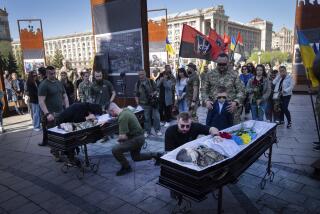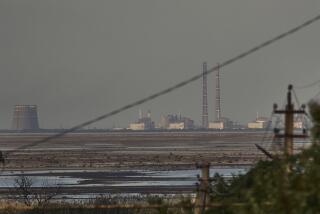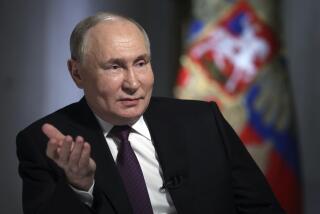Soviets Offer to Open Test Sites : U.S. Rejects Linking Inspections to Moratorium on Nuclear Blasts
In a private letter to President Reagan, Soviet leader Mikhail S. Gorbachev has offered to allow on-site inspection of his country’s underground nuclear sites, provided the United States joins the Soviet Union in a moratorium on nuclear testing.
The White House welcomed the Soviet offer, which was made public in a Pravda editorial, but quickly rejected Moscow’s condition that the United States first join a ban on testing.
Presidential spokesman Larry Speakes said that the issue of verification should not be linked to a cessation of nuclear tests and reiterated the Administration’s intent to continue its testing program “to ensure the reliability and safety of the U.S. arsenal.”
Test-Ban Talks Urged
In the letter, Gorbachev also urged Reagan to approve a resumption of U.S.-Soviet negotiations next month on a treaty to ban such nuclear tests.
The Soviet leader suggested that Reagan accept an offer by the leaders of six countries to verify a superpower ban on testing by installing seismic and other monitoring devices on their own territories, the Associated Press reported. If there were still “ambiguities” afterward, Gorbachev reportedly said, American inspectors could go to Soviet test sites to see for themselves.
The Soviet Union, Pravda said, “stands for coming to terms with the United States, in establishing now a moratorium on nuclear explosions, also on certain measures of on-site verification to remove the possible doubts about compliance with such a moratorium.”
“The political significance of such a joint step by the Soviet Union and the United States would be great,” Pravda said. “It would give a certain signal also to the other nuclear powers and create a qualitatively new situation which would be much more felicitous for a positive development of the process started by the Soviet-U.S. summit meeting. . . .
“With the testing ranges silent and no peaceful nuclear blasts being conducted, neither side would risk violating the moratorium and assuming grave political responsibility for such a step before the entire world public.”
The Soviet offer seemed to set off a replay of the jockeying that preceded last month’s Geneva summit. At the White House, Speakes stressed that the idea of unconditional inspection of nuclear sites originated with Reagan and not with Gorbachev, whose mastery of public relations skills continues to irk the White House.
U.N. September Speech
In a speech to the United Nations in September, Reagan offered to permit Soviet inspectors at U.S. test sites, and then a month later, he formally extended an invitation to the Soviets to attend a nuclear test in Nevada.
“We gave them the key to the gate out in Nevada,” Speakes said, referring to a prime U.S. test site. “They never showed. They can come tomorrow if they like.”
Because the Soviet proposal was conveyed to Reagan personally by Gorbachev, it is more difficult for the Administration to dismiss it as a propaganda ploy, even though the U.S. position on a testing moratorium is well known by the Soviets.
“We will be glad to continue to talk to them about on-site inspections, but, as for a moratorium, we would not agree to it at this time,” Speakes said.
The Administration repeatedly has said that U.S. nuclear tests are necessary to close the weapons gap with the Soviet Union. Top officials have taken a skeptical view of the Soviet offer, claiming that the Soviets were willing to embrace a moratorium only because they had concluded a round of testing.
“It’s part of their P.R. effort to play the good-guy role,” one senior White House official contended.
Still, top officials said that they would attempt to pursue the verification aspect of the proposal when arms control talks resume next month in Geneva despite their suspicion that the Soviets are only manipulating world opinion.
‘A Public Offer’
“At least it’s a public offer that we can have discussions on,” a White House official said.
Some officials took a more optimistic view, seeing the offer as evidence that the Soviets finally are coming to grips with the importance of verification as an issue in the arms race between the superpowers.
“The Soviets have heeded our concerns about better verification and seem to be hinting on movement on verification,” said Kenneth S. Adelman, director of the U.S. Arms Control and Disarmament Agency.
White House officials viewed the lofty rhetoric of the Pravda editorial as part of a Kremlin campaign to increase pressure on Reagan to join the Soviet moratorium before it expires Jan. 1.
When Gorbachev imposed the unilateral ban Aug. 6, the White House interpreted the gesture as an effort to court public opinion and divide the North Atlantic Treaty Organization before the November summit.
Public, Private Difference
The Soviet leader pressed Reagan in Geneva for a test ban agreement and then renewed the proposal in an address to the Supreme Soviet on his return.
An Administration official who was involved in the Geneva summit said there is a vast difference between what the Soviets say in public and how they behave in private. For example, he said, the Soviets still have not responded to a U.S. offer made last June to have experts from both sides confer on possible verification procedures.
“If they really wanted to talk turkey, they’d take us up on it and start doing it,” he said.
The Pravda editorial dismissed the doubts the United States has previously expressed about whether small nuclear explosions can be adequately detected. “The verification problem . . . cannot be seen as an impediment to reaching agreement on a mutual moratorium,” Pravda said. “It is quite soluble, and the Soviet Union proposes concrete ways of resolving it in a mutually acceptable way.”
Pravda then cited Soviet willingness to accept nuclear monitoring stations in six strategically located nations--Argentina, Greece, India, Mexico, Sweden and Tanzania. The leaders of these countries have all urged an end to nuclear testing.
Specifics Lacking
Nonetheless, a White House official noted that the Soviets were noticeably lacking in any specifics about what kind of monitoring equipment they would tolerate in those nations.
“It would be good only if it’s comprehensive enough to do the job,” he said.
The Soviet proposal created a sense of deja vu for Administration officials involved in the Geneva summit. They anticipate more such exchanges as the superpowers position themselves for next year’s summit, which is expected to take place in Washington sometime in the fall.
The next move may be from Reagan, who must decide whether the United States should continue to abide by the second Strategic Arms Limitation Treaty, which expires Dec. 31. The Administration has been adhering to its provisions, though the treaty was never ratified by the Senate.
A Pentagon report scheduled to go to Reagan shortly spells out in elaborate detail a number of flagrant violations of the treaty by the Soviets. Defense Secretary Caspar W. Weinberger has urged Reagan not to extend U.S. compliance, but the White House appears unwilling to jeopardize the bonds the President believes he established with Gorbachev in Geneva.
A senior White House official shrugged off the yearend deadline on SALT II as “no magic date” and said he anticipates no change in the Administration’s position. “We’ve agreed to abide by it,” he said of the treaty.
Eleanor Clift reported from Washington and William J. Eaton from Moscow.
More to Read
Start your day right
Sign up for Essential California for news, features and recommendations from the L.A. Times and beyond in your inbox six days a week.
You may occasionally receive promotional content from the Los Angeles Times.






